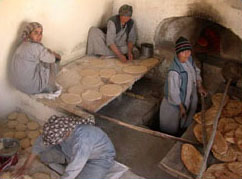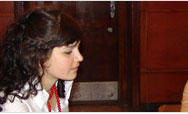You are here » Home » Telling Our Story
First Person
USAID-funded bakeries in Afghanistan provide bread for a quarter of Kabul
Providing Women the Tools to Earn a Living

Photo: Alejandro Chicheri
Afghan women prepare flatbreads at a bakery.
“This is not a time to weep, but to work… We have responsibilities.”
USAID provides Afghan women with the means to earn a living through 86 bakeries managed by widows that help feed the elderly, disabled,orphans and other destitute families bakeries. Employing 897 poor women, this program reached more than 176,000 Kabul residents in 2003 with a daily ration of fortified bread at a subsidized price.
Each day, from sunrise to sunset, the women bake well over 2,000loaves of bread. In one bakery, 12 women rotate functions—weighing dough, kneading it, rolling it out, and shaping it into the long, oval flatbreads preferred in Afghanistan. They use their fingertips to press holes in the flattened loaves to let the steam escape, place the dough on paddles and push them into the woodburningoven. The bread produced in these bakeries is of superior quality. Made with fortified wheat flour, much of which is provided by USAID, the loaves are more than twice as large as the typical product produced by Kabul’s commercial bakeries.
While the women here still count on wheat from the United States, many bakeries are already considering options for becoming financially self-sufficient. Despite their hardships, the women smile as they knead and explain their motivation to bake bread: “This is not a time to weep, but to work. If we continue to be sad or depressed, who is going to take care of usand our children? We have responsibilities.”
Print-friendly
version of this page (244kb - PDF)
Back to Top ^ | 



